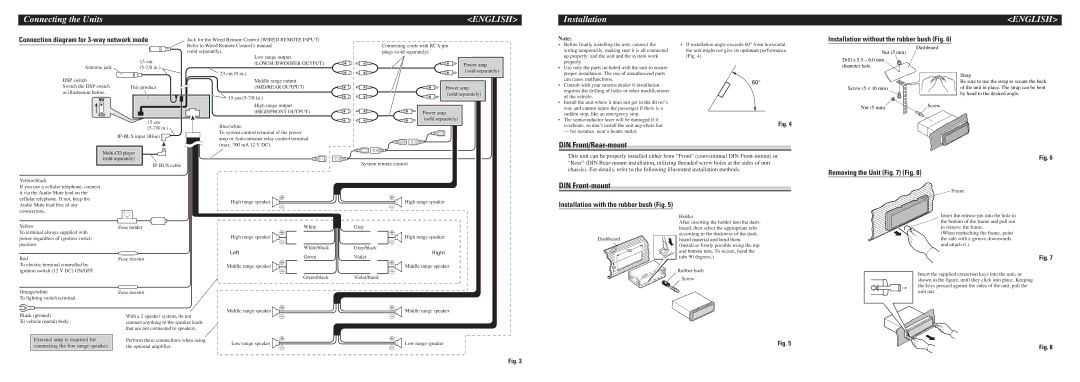
Connecting the Units | <ENGLISH> |
Installation
<ENGLISH>
Connection diagram for 3-way network mode
Antenna jack | 15 cm |
Jack for the Wired Remote Control (WIRED REMOTE INPUT) Refer to Wired Remote Control’s manual
(sold separately).
Low range output
(LOW/SUBWOOFER OUTPUT)
23 cm (9 in.)
Connecting cords with RCA pin plugs (sold separately)
Power amp (sold separately)
Note:
• Before finally installing the unit, connect the |
wiring temporarily, making sure it is all connected |
up properly, and the unit and the system work |
properly. |
• Use only the parts included with the unit to ensure |
proper installation. The use of unauthorized parts |
•If installation angle exceeds 60° from horizontal, the unit might not give its optimum performance. (Fig. 4)
Installation without the rubber bush (Fig. 6)
Dashboard
Nut (5 mm)
Drill a 5.5 – 6.0 mm diameter hole.
Strap
DSP switch
Switch the DSP switch This product as illustration below.
15 cm
![]()
Middle range output
(MID/REAR OUTPUT) ![]() 15 cm
15 cm
High range output
(HIGH/FRONT OUTPUT)
Blue/white
To system control terminal of the power amp or
Power amp (sold separately)
Power amp (sold separately)
can cause malfunctions. |
• Consult with your nearest dealer if installation |
requires the drilling of holes or other modifications |
of the vehicle. |
• Install the unit where it does not get in the driver’s |
way and cannot injure the passenger if there is a |
sudden stop, like an emergency stop. |
• The semiconductor laser will be damaged if it |
overheats, so don’t install the unit anywhere hot |
— for instance, near a heater outlet. |
60°
Fig. 4
Screw (5 ⋅ 16 mm)
Nut (5 mm) | Screw |
|
Be sure to use the strap to secure the back of the unit in place. The strap can be bent by hand to the desired angle.
Yellow/black
If you use a cellular telephone, connect it via the Audio Mute lead on the cellular telephone. If not, keep the Audio Mute lead free of any connections.
(max. 300 mA 12 V DC).
+
High range speaker
≠
System remote control
+
High range speaker
≠
DIN Front/Rear-mount
This unit can be properly installed either from “Front” (conventional DIN
DIN Front-mount
Installation with the rubber bush (Fig. 5)
Holder
Fig. 6
Removing the Unit (Fig. 7) (Fig. 8)
Frame
Insert the release pin into the hole in
Yellow | Fuse holder |
To terminal always supplied with |
|
power regardless of ignition switch |
|
position. |
|
High range speaker
Left
White
+
≠
White/black
Gray
+
≠
Gray/black
High range speaker
Right
Dashboard
182
After inserting the holder into the dash- board, then select the appropriate tabs according to the thickness of the dash- board material and bend them.
(Install as firmly possible using the top and bottom tabs. To secure, bend the
the bottom of the frame and pull out to remove the frame.
(When reattaching the frame, point the side with a groove downwards and attach it.)
Red
To electric terminal controlled by ignition switch (12 V DC) ON/OFF.
Orange/white
To lighting switch terminal.
Fuse resistor
Fuse resistor
Middle range speaker
Green
+
≠
Green/black
Violet
+
≠
Violet/black
Middle range speaker
53
tabs 90 degrees.)
Rubber bush
Screw
Fig. 7
Insert the supplied extraction keys into the unit, as shown in the figure, until they click into place. Keeping the keys pressed against the sides of the unit, pull the unit out.
Black (ground)
To vehicle (metal) body.
External amp is required for connecting the low range speaker.
With a 2 speaker system, do not connect anything to the speaker leads that are not connected to speakers.
Perform these connections when using the optional amplifier.
+ | + |
Middle range speaker |
|
≠ | ≠ |
+ | + |
Low range speaker |
|
≠ | ≠ |
Middle range speaker
Low range speaker
Fig. 5
Fig. 8
Fig. 3
